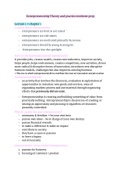Entrepreneurship Theory and practice midterm prep
Lecture 1 → chapter 1
5 myths about entrepreneurs:
- entrepreneurs are born & not raised ´
- entrepreneurs are risk takers
- entrepreneurs are motivated primarily by money
- entrepreneurs should be young & energetic
- Entrepreneurs love the spotlight
WHY IS ENTREPRENEURSHIP IMPORTANT:
it provides jobs, creates wealth, creates new industries, improves society,
helps people, helps environment, creates competition, new activities, drives
more radical & disruptive forms of innovation, introduces new disruptive
business models, challenges but also improves existing business
→ The ares in which entrepreneurial firms contribute the most are innovation and job creation
Entrepreneurship def:
- an activity that involves the discovery, evaluation & exploitation of
opportunities to introduce new goods and services, ways of
organizing markets process and raw material through organizing
efforts that previously did not exist.
- Entrepreneurship is creating and building something of value from
practically nothing. Entrepreneurship is the process of creating or
seizing an opportunity and pursuing it regardless of resources
presently controlled.
Why do people become entrepreneurs?
- autonomy & freedom → be your own boss
- pursue own ideas - be in charge of your own destiny
- pursue financial rewards
- to make a difference & make an impact
- contribute to society
- they have a cause or passion
- to leave a legacy
- out of necessity
characteristics of successful entrepreneurs:
1. passion for business
2. focusing of customer / product
, 3. tenacity despite failure
4. execution intelligence
→ team composition is important for success for entrepreneurs.
chapter 1 book notes:
Firms & Entrepreneurship:
Established firms with entrepreneurial emphasis: proactive, innovative, &
risk taking. e.g Google → widely recognized as a firm in which entrepreneurial behaviors are
clearly evident.
Established firms who entrepreneurially practice corporate
entrepreneurship’
There is a spectrum for firms to showcase how entrepreneurs they are,
ranging from highly Conservative to highly entrepreneurial
The position a company takes on that continuum = entrepreneurial
intensity
Entrepreneurial firms = proactive innovators and are not averse to taking
risks. Conservative firms = “wait and see” posture, are less innovative, and
are risk averse.
→ Firms with higher entrepreneurial intensity regularly look for ways to cut
bureaucracy.
Types of start up firms
Salary-substitute firms
- small firms
- income = similar as to what you would get when employed (salary)
- services / goods are not innovative but relatively common
e.g. convenience store, restaurants, dry cleaner
lifestyle firms
- promote a particular sport, hobby, or pastime
- these types of frim are not innovative, nor do they grow quickly.
- only the owner or a handful of people are usually employed
e.g personal trainers,gold pro, owner of bed and breakfast etc
entrepreneurial firms
- new products and services are introduced to the market
- value is created and then value is disseminated to customers
,Entrepreneurship and Demographics
increasing number of women, minorities, seniors, and millennials are
becoming actively involved in the entrepreneurial process. Evidence
suggests that these groups are capable of appropriately using the
entrepreneurial process as a foundation for developing a successful
entrepreneurial venture.
Entrepreneurship seems to have a + impact on the economy and society. In
addition, entrepreneurial firms have a positive impact on the effectiveness
of larger firms.
4 distinct elements of the entrepreneurial process =
- deciding to become an entrepreneur
- developing successful business ideas
- moving from an idea to establishing an entrepreneurial firm
- managing and growing an entrepreneurial firm.
Each of these elements plays a critical role in entrepreneurial success.
, Lecture 2 → chapter 2 - Generating ideas
where do good ideas come from?
→ interactions w other ppl are vital for us to come up w other/new ideas
idea vs opportunity
→ An idea has the potential to become an opportunity...
Many entrepreneurial ventures fail because there was no real opportunity to
begin with
recognize vs create:
Recognize : opportunities are out there you just need to find them. Find a
problem and create a
solution and business to
fill the “opportunity gap”
Create: the entrepreneur
creates a new need (a
solution (product/service)
without a problem) and
exploits it.
opportunity = favorable set of circumstances that identifies or creates a
need for a new product or service.
Opportunities are difficult to spot ...something that is not already available
that people need and are willing to pay for.
good example: airbnb
anchored in existing business
and becomes a substitute for
existing products like hotels
etc
sources of opportunities:
1. Observing trends
2. Solving a problem
3. Finding gaps in the
marketplace





